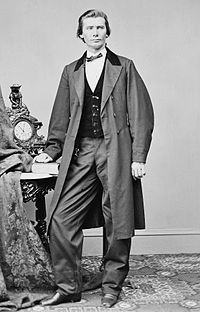Sempronius H. Boyd
| Sempronius Hamilton Boyd | |
|---|---|
 |
|
| Member of the U.S. House of Representatives from Missouri's 4th district |
|
|
In office March 4, 1863 – March 3, 1865 March 4, 1869 – March 3, 1871 |
|
| Preceded by |
Elijah H. Norton Joseph J. Gravely |
| Succeeded by |
John R. Kelso Harrison E. Havens |
| Personal details | |
| Born |
May 28, 1828 Williamson County, Tennessee, USA |
| Died | June 22, 1894 (aged 66) Springfield, Missouri, USA |
| Political party | Unconditional Unionist, Republican |
| Occupation | Politician, Lawyer, Judge, Teacher, Diplomat |
Sempronius Hamilton Boyd (May 28, 1828 – June 22, 1894) was a nineteenth-century politician, lawyer, judge and teacher from Missouri.
Born in Williamson County, Tennessee near Nashville, Boyd moved to a farm near Springfield, Missouri with his parents in 1840 where he was educated by private tutors. He moved to California in 1849 where he prospected for gold and taught school. He moved back to Missouri in 1854 where he was clerk of the court of Greene County, Missouri from 1854 to 1856, studied law and was admitted to the bar in 1856, commencing practice in Springfield, Missouri.
Boyd served as mayor of Springfield in 1856 and at the outbreak of the Civil War, raised the 24th Missouri Infantry for the Union Army, serving as its colonel from 1861 to 1863. He was elected an Unconditional Unionist to the United States House of Representatives in 1862, serving from 1863 to 1865. There, he served as chairman of the Committee on Revisal and Unfinished Business from 1863 to 1865. Boyd was a member of the Republican National Committee from 1864 to 1868, was a delegate to the Republican National Convention in 1864, and was appointed judge of the court of the fourteenth judicial district in 1865. The same year, he presided over the trial of Wild Bill Hicock over the death of Davis Tutt, during which he famously suggested to the jury the possibility of nullification, which they proceeded to do.
...
Wikipedia
